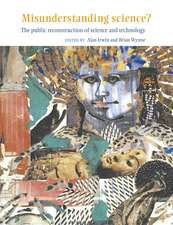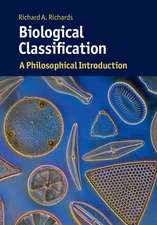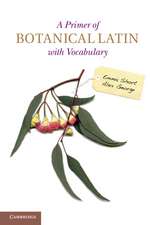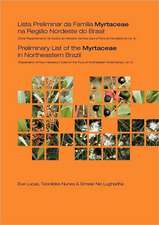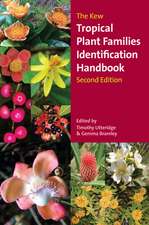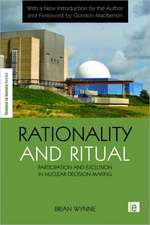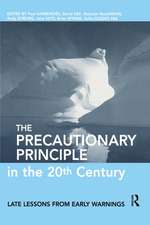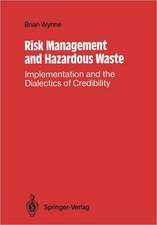Barcoding Nature: Shifting Cultures of Taxonomy in an Age of Biodiversity Loss
Autor Claire Waterton, Rebecca Ellis, Brian Wynneen Limba Engleză Hardback – 27 iul 2016
This book is based on six years of ethnographic research on changing practices in the identification and classification of natural species. Informed both by Science and Technology Studies (STS) and the anthropology of science, the authors analyse DNA barcoding in the context of a sense of crisis – concerning global biodiversity loss, but also the felt inadequacy of taxonomic science to address such loss. The authors chart the specific changes that this innovation is propelling in the collecting, organizing, analyzing, and archiving of biological specimens and biodiversity data. As they do so they highlight the many questions, ambiguities and contradictions that accompany the quest to create a genomics-based environmental technoscience dedicated to biodiversity protection. They ask what it might mean to recognise ambiguity, contradiction, and excess more publicly as a constitutive part of this and other genomic technosciences.
Barcoding Nature will be of interest to students and scholars of sociology of science, science and technology studies, politics of the environment, genomics and post-genomics, philosophy and history of biology, and the anthropology of science.
| Toate formatele și edițiile | Preț | Express |
|---|---|---|
| Paperback (1) | 310.96 lei 22-36 zile | +21.01 lei 5-11 zile |
| Taylor & Francis – 14 oct 2024 | 310.96 lei 22-36 zile | +21.01 lei 5-11 zile |
| Hardback (2) | 764.20 lei 43-57 zile | |
| Taylor & Francis – 27 iul 2016 | 764.20 lei 43-57 zile | |
| Taylor & Francis – 23 apr 2013 | 848.15 lei 43-57 zile |
Preț: 764.20 lei
Preț vechi: 1239.39 lei
-38% Nou
Puncte Express: 1146
Preț estimativ în valută:
146.28€ • 158.94$ • 122.95£
146.28€ • 158.94$ • 122.95£
Carte tipărită la comandă
Livrare economică 21 aprilie-05 mai
Preluare comenzi: 021 569.72.76
Specificații
ISBN-13: 9781138146334
ISBN-10: 1138146331
Pagini: 224
Ilustrații: 28
Dimensiuni: 156 x 234 mm
Greutate: 0.45 kg
Ediția:1
Editura: Taylor & Francis
Colecția Routledge
Locul publicării:Oxford, United Kingdom
ISBN-10: 1138146331
Pagini: 224
Ilustrații: 28
Dimensiuni: 156 x 234 mm
Greutate: 0.45 kg
Ediția:1
Editura: Taylor & Francis
Colecția Routledge
Locul publicării:Oxford, United Kingdom
Public țintă
PostgraduateCuprins
1. Introduction 2. DNA Barcoding: Revolution or Conciliation? 3. What’s In a Barcode? The Use, Selection and De-Naturalisation of Genetic Markers 4. A Leg Away for DNA: Mobilizing, Compiling and Purifying Material for DNA Barcoding 5. Extending the Barcoding Frontier 6. Archiving Diversity: BOLD 7. BOLI as Redemptive Technoscientific Innovation 8. What Is It? Identifying Nature and Valuing Utility 9. Barcoding Nature: Final Reflections
Notă biografică
Claire Waterton is Senior Lecturer in Environment and Society and Co-Director of the Centre for the Study for Environmental Change (CSEC) within the Sociology Department of Lancaster University.
Rebecca Ellis is Lecturer in the Lancaster Environment Centre at Lancaster University.
Brian Wynne is Professor of Science Studies at CSEC Lancaster University, and from 2002--2012 was co-PI and Associate Director of the ESRC Centre, Cesagen.
Rebecca Ellis is Lecturer in the Lancaster Environment Centre at Lancaster University.
Brian Wynne is Professor of Science Studies at CSEC Lancaster University, and from 2002--2012 was co-PI and Associate Director of the ESRC Centre, Cesagen.
Descriere
Informed both by Science and Technology Studies (STS) and the anthropology of science, Barcoding Nature analyses DNA barcoding in the context of a sense of crisis – concerning global biodiversity loss, but also the felt inadequacy of taxonomic science to address such loss. The authors chart the specific changes that this innovation is propelling in the collecting, organizing, analyzing, and archiving of biological specimens and biodiversity data.


